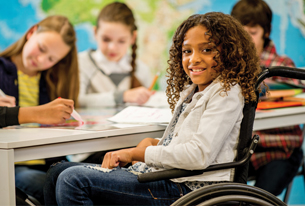By: Sara Duke
Sitting in her chair listening to her teacher read the next chapter of Junie B Jones, your daughter is surrounded by her classmates. While some classmates will sit quietly just like her, others may shout in excitement, flap their hands as they process the story, use a book with larger print, or have an assistant helping him/her to understand the story. Some are like her and some are different. In life she is going to encounter all different kinds of people with and without disabilities at school, the mall, church, work, etc. It is our differences that make us unique. Who would want to live in a world where we are all the same? However, it’s those same differences that often times make us uncomfortable. Weird, odd, strange, stupid….those are all stereotypical words society uses to describe others with special needs. Those words need to be replaced with unique, talented, determined, capable, etc. Parents and teachers alike can help smash these stereotypes, and help our world become a more compassionate place.
Some disabilities are obvious, like a physical disability – such as a wheelchair. While others can’t be seen by the eye – like a learning disability. In my career I have been a sponsor of the Everybody Counts Council at Burns Elementary, and the Council for Exceptional Children at Apollo High School. With both of these clubs, I have pushed the mission that we are more alike than different. For example, a student may struggle to be in class because he or she is overstimulated by all the people and noises, but if you take time to talk to that student and get to know the person maybe you have more in common than you think. Perhaps, both of you love Minecraft or both love pepperoni pizza. As individuals, we need to put more of an emphasis on our ABILITIES and focus less on disabilities.
The question is how do we get past those uncomfortable feelings, squash the stereotypes, and educate all to be more accepting of others’ differences and abilities? It starts with our children. We talk about it. We talk about the hard things. We talk about the easy things. We talk to those with disabilities. Every year I always follow the Wendall Foster Center’s No R Word Campaign, and do something at my school to go along with it. I remember my oldest son being in preschool and signing the school wide pledge. I’m not sure he really grasped the concept, but he knew it was important to be kind to others. Several weeks later he witnessed me crying. I can’t even remember what I was upset about now, but I remember Brayden asking me, “Momma, did someone say the R word to you?” Even as a toddler, he knew that the R word is hurtful and can elicit very real emotions for people. It is my mission as a mother to teach my children compassion and acceptance.
As parents we can help children and others around us become more compassionate and educated people. Here are some tips to share with your kids:
• If you see or know someone with a disability, talk to them. I think we fear that we will say something wrong, but you talk to someone with a disability just like you talk to someone without a disability. “Hi, my name is _____________. What’s your name?” or “I really like your (insert band name) shirt. That’s my favorite band, too.” Look past the disability and see them as the amazing person they are.
• Don’t be afraid to ask questions about his/her disability, but also be aware that they may not be comfortable talking about it. Shelly, one of my friends in a wheelchair, spoke to my class several years in a row. She said something to the extent of, “If you have a question about why I’m in a wheelchair, why don’t you just ask me? I’d love to tell you about it.” As I said earlier, the fear of the unknown is a big part of the lack of understanding in society. It’s easy. Just ask. And if they don’t want to talk about it that’s OK, too.
• Speaking of talking, talk normally and talk to the person with the disability. Don’t talk louder or use baby talk. They’re people too, and deserve the same respect as anyone else. Also, if they are with an assistant, parent, or caregiver of any sort, it is still important to talk directly to the person. They have their own voice or ways they want to be heard and acknowledged.
• Lastly, always be kind. You wouldn’t want someone to call you a name, so don’t do that to others. If you always practice the golden rule in life, do unto others as you would have them do unto you, then you are going to leave a legacy of love for all. Remember, not all disabilities can be seen by all, but kindness can be felt by all.
While you are busy teaching your children all the ins and outs of life, spend meaningful time teaching them about respecting each and every person that they meet. The days of students with special needs being taught in the trailer behind the school never seen by others are thankfully over. This means your child will more than likely have students of all ABILITIES in his/her class at school. Teach them that it is okay for people to be different from you, and remind them that there are things that are easier and harder for every person to do. A smile can go a long way. Go ahead, smile and start up a conversation. You won’t regret it. I know some really amazing people with disABILITIES, and they bless my life every single day!

